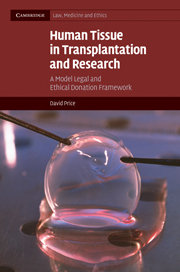Book contents
- Frontmatter
- Dedication
- Contents
- Preface
- Table of cases cited
- Table of selected statutory sources
- Introduction
- 1 Human biological materials
- 2 Interests in the living body and corpse
- 3 Eliciting wishes
- 4 Consent to donation
- 5 Presumed consent
- 6 Informed consent
- 7 Living donation
- 8 Property in human material
- Conclusion
- Index
- References
2 - Interests in the living body and corpse
Published online by Cambridge University Press: 05 July 2014
- Frontmatter
- Dedication
- Contents
- Preface
- Table of cases cited
- Table of selected statutory sources
- Introduction
- 1 Human biological materials
- 2 Interests in the living body and corpse
- 3 Eliciting wishes
- 4 Consent to donation
- 5 Presumed consent
- 6 Informed consent
- 7 Living donation
- 8 Property in human material
- Conclusion
- Index
- References
Summary
This chapter critically considers the interests that living individuals have in their bodies whilst they are still alive and once they are dead, and those of the next of kin of deceased persons, and the relative weights of such interests compared with the needs of those requiring body materials for transplantation or of society in researching and developing knowledge of human conditions and their effective treatments. Where such interests exist then compelling reasons are required to override the normal respect which they warrant. This is a subject at the very heart of this work as it points to the proper system of donation which a society should adopt, in terms of whether it is necessary to obtain consent for donation, and from whom. Where an individual interest is infringed this constitutes a legal/moral harm to that person. However, whilst no harm will accrue to an individual who has consented to it, at least not from a liberal or rights perspective, even consented-to acts may constitute public wrongs, proscribed by the criminal law.
Whilst such issues are problematic with regard to the taking and use of human material from the living, the issue of what interests exist with respect to the dead human form is hugely more contentious and the subject of considerably diverse opinion. This diversity manifests itself in varying attitudes to conscription, presumed consent, mandated choice, directed donation, required request and a host of other matters. Inconsistency and confusion in this regard has been harmful to both transplantation and research, and substantial deconstruction is essential. I entertain the interests of the living only, as the dead themselves are not in possession of interests capable of being affected by the actions of others. Nonetheless, prior to their deaths individuals have interests which are capable of being affected by the actions of others after their deaths, including with regard to decisions to donate or not to donate organs or tissues for therapy or research.
- Type
- Chapter
- Information
- Human Tissue in Transplantation and ResearchA Model Legal and Ethical Donation Framework, pp. 43 - 76Publisher: Cambridge University PressPrint publication year: 2009



